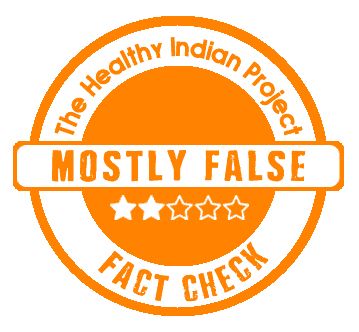Last Updated on April 11, 2023 by Dr. Shikha Shiromani
Quick Take
A social media post claims you can become healthy if you eat your placenta after delivering the baby. We fact-checked and found this claim to be Mostly False.

The Claim
A Twitter post reads, “Wanna be healthy after you have a baby? Eat your placenta!!”
Fact Check
What is human placentophagy?
During pregnancy, the placenta develops to supply the growing fetus with nutrients and oxygen. Following childbirth, it is naturally discharged from the mother’s body. Maternal human placentophagy is the act of consuming one’s own placenta after giving birth. This can be done in various ways, such as consuming a raw piece of the placenta immediately after delivery or preparing it by heating, drying, and grinding it into powder. The various forms in which it is consumed are raw, cooked, dehydrated, processed, or encapsulated for the assumed potential health benefits for mothers and their offspring.
Is consuming your placenta safe and healthy?
No. While some claim that placentophagy can be beneficial in various ways, there’s no evidence that eating the placenta provides health benefits. The practice of eating the placenta is common in the animal kingdom. However, the same is not true for humans.
The claimants believe that placentophagy, i.e., consuming the placenta, either raw, cooked, or encapsulated, offers protection against postpartum depression, reduces post-delivery pain, boosts energy, helps with lactation, promotes skin elasticity, enhances maternal bonding or replenishes iron in the body. However, there is a lack of credible scientific evidence proving this.
There is only a little evidence that shows that the human placenta is enriched with nutrients, such as protein and minerals. However, the research doesn’t mention anything about its safe consumption.
Placentophagy can be harmful as the placenta can contain harmful bacteria, viruses, or environmental toxins that can potentially harm both the mother and the baby.

Adding to this, Dr. Surabhi Solanki, Homeopathic physician and women’s reproductive health awareness campaigner from Uttarakhand states, ” Eating placenta is not recommended by doctors as it is harmful for both mother and the baby. Placenta contains harmful bacteria and virus which may cause infection not only to the mother but also to the new born baby who is consuming mother’s milk.”
Research states that the intake of placenta capsules should be avoided owing to inadequate eradication of infectious pathogens during the encapsulation process.
There are also possible detrimental health risks associated with placental consumption in women. There is no scientific research regarding the beneficial effects of human placentophagia,
Eating the placenta is touted by some who believe there are health benefits for mothers, but a study found no such benefit. The researchers also noted that there had been no studies conducted on whether eating the placenta has any potential risks.
In conclusion, further research is needed on this to prove the purported benefits of consuming placenta. Until then, one should refrain from such practice as it poses significant health risks for both the mother as well as the baby.
Disclaimer: Medical Science is an ever evolving field. We strive to keep this page updated. In case you notice any discrepancy in the content, please inform us at [email protected]. You can futher read our Correction Policy here. Never disregard professional medical advice or delay seeking medical treatment because of something you have read on or accessed through this website or it's social media channels. Read our Full Disclaimer Here for further information.

